- Home
- Shirley Jackson
Let Me Tell You: New Stories, Essays, and Other Writings Page 28
Let Me Tell You: New Stories, Essays, and Other Writings Read online
Page 28
“I want some cookies,” the baby said immediately.
“Later,” Mrs. Carrant said. “When Daddy comes.” It was 8:15.
The baby’s face twisted up; it was long past her bedtime. “When Daddy comes,” Mrs. Carrant went on quickly, “we’ll all have cookies and milk, and Daddy will have presents for you. Remember what it said in Daddy’s letter?”
“It said he was going to bring us presents,” Sandra explained to the baby. “In Daddy’s letter it said he had presents for all of us. Mommy, too.”
If he hadn’t stopped for his bags, or if he’d gotten a taxi quickly, or even if the train had been early, he might be starting to ring the doorbell now; Mrs. Carrant wondered for a minute if trains were ever early. They had said at the station that it was on time; Mrs. Carrant resisted an impulse to call the station again. As soon as I get on the phone, she thought, the doorbell will be ringing. Anyway, it’s silly to call the station and ask if a train is early.
“Can I get down off the couch for a minute?” Sandra asked. “To get my doll?”
“That doll’s so dirty,” Mrs. Carrant said. “He should be here any minute, and you wouldn’t want Daddy to see you with an old dirty doll.”
“I want my doll,” Sandra said.
“I want my bear,” the baby said. Both the girls were beginning to stir uneasily on the couch, moving apart from each other, the book fallen untidily between them.
“The doll is dirty, but that bear is impossible,” Mrs. Carrant said firmly. “You sit still for just one minute more.” She went over and picked up the book and opened it neatly. “How many miles to Babylon?” she said as cheerfully as she could. “Three score miles and ten.” The doorbell rang, and suddenly Mrs. Carrant understood that it might be anything; it might be someone coming to see her, not knowing he would be here, it might be a telegram, it might be some sort of a mistake. She went to the door and pressed the downstairs buzzer.
“That’s Daddy?” Sandra said, looking at the door.
“We hope it is,” Mrs. Carrant said steadily, and went over to open the door.
She stood in the doorway watching him come up the last few steps. He had an embarrassed smile on his face, and Mrs. Carrant realized that she had the same embarrassed smile on her face.
“I thought I had the wrong house for a minute,” he said. He came up to her and set his bag down (only one bag, after all) and put his arms around her. She could hear him say “My God,” looking over her head into the living room.
Mrs. Carrant turned around. “Look at them,” she said. “The two of them.” Sandra and the baby were sitting perfectly still on the couch, regarding their father with wide, surprised eyes. They never dreamed anyone was really coming, Mrs. Carrant thought. Then Sandra slid down off the couch, shrieking “Daddy brought us presents!” as she ran across the floor to be picked up. He looks so tired, Mrs. Carrant thought, seeing him holding Sandra; his hair is thinning.
“Baby,” Mrs. Carrant said, “here’s Daddy at last.”
Still holding Sandra, he went across the room to the couch. “So this is my daughter Mary?” he said. “Will you come say hello to Daddy?”
The baby’s face twisted, and she screamed “Mommy!” She threw herself off the couch and ran to Mrs. Carrant, burying her face against her mother’s knees. Mrs. Carrant leaned over and picked her up.
“I guess I scared her,” he said uncomfortably. He reached out to touch the baby’s head, but she screamed again and hid her face.
“What’s the matter with her?” he said.
“She’s never seen you before,” Mrs. Carrant said sharply. “You can’t really blame her.”
“Baby’s scared,” Sandra said, leaning outward to look into her father’s face. “Maybe you better give her the presents right now.”
The baby had stopped crying, her head against her mother’s shoulder. “Now what’s wrong with you?” Mrs. Carrant asked, putting her head down against the baby’s. “What’s there to make a fuss about?”
“Santy Claus,” the baby said. “I want to see Santy Claus.” Her voice rose. “Where’s Santy Claus?”
“She thinks you’re Santa Claus,” Sandra explained to her father, “because you were bringing presents.”
“It’s going to take her a little while.” Mrs. Carrant looked hopefully at her husband across the baby’s head. “She doesn’t take to—” She stopped. “You see,” she went on carefully, “it’s hard for her, only knowing you from your picture.” She took the baby over to the mantel where the picture was. “Look,” she said. “Who’s that in the picture?” she asked the baby.
The baby looked up sullenly, and then said, “Daddy.” She reached over and took hold of the picture.
“It’s a picture of me, isn’t it?” her father said. “Do I look so different? It’s a picture of me and here I am standing here.” He turned to his wife. “What’s the matter with her?”
“She thought Santa Claus was coming,” Sandra said.
He set Sandra down on the couch and approached the baby again. “Hello, there,” he said.
The baby stared at him silently, holding the picture with both hands. When he put his finger out to touch her nose, she turned her head quickly to hide in her mother’s shoulder. He shrugged.
“This the new furniture?” he said. “Looks pretty good. Can’t you put her to bed or something?”
“I guess I’d better,” Mrs. Carrant said. “You want to take Daddy’s picture to bed?” she asked the baby.
The baby nodded, holding the picture.
“Tomorrow,” Mrs. Carrant said. “Tomorrow you can get acquainted, and in a day or so she’ll be all over you. She’s tired now anyway.”
Mrs. Carrant waited for a minute, looking at her husband. “After all,” she said helplessly.
Murder on Miss Lederer’s Birthday
From the kitchenette where Miss Alliston was making breakfast came the pleasant sound of coffee percolating and the rather flat sound of Miss Alliston humming cheerfully to herself. It was not quite nine o’clock, and the sunlight had just begun to creep along the edge of the living room carpet; a breeze came gently through the half-opened window and stirred the petals of the geranium on the windowsill. It was an apartment clearly inhabited by two maiden ladies of a certain age; an unashamed rocking chair sat next to the radiator, with a tiny needlepoint footstool in front of it; on the mantel were two matched earthenware jugs, each saying SOUVENIR OF MEXICO CITY; all the chairs were daintily antimacassared. As though extremely conscious of the fact that he was a spot of local color, a large gray tomcat sat washing his face in the patch of sunlight on the floor.
Miss Alliston and Miss Lederer were schoolteachers (“the Two Musketeers of Houston High,” they called themselves privately, and they were given to wildly reckless dinners at Italian restaurants on Friday afternoons, with half a bottle of red wine and veal scallopine), and they had done their best to make their apartment homey. “I feel so sorry for those other poor girls,” they were fond of observing to each other, “living in furnished rooms or private homes, with none of our comfort, and none of our…well, dear…freedom.”
Miss Alliston was the senior by a year and a half; at forty-one, she’d given herself the position of leader. It had been Miss Alliston’s idea to go to Mexico one summer. It was to Miss Alliston, too, that the one souvenir ashtray belonged; she enjoyed an occasional cigarette after their Friday evening meal, although she disapproved of the habit for Miss Lederer. “I do so enjoy my smokes,” she would say sinfully, “but no one recognizes more clearly than I how filthy a habit it is.”
Miss Alliston and Miss Lederer took turns on Saturday mornings getting up and making breakfast. This morning, Miss Alliston was unusually cheerful, for it was Miss Lederer’s birthday and they had planned An Occasion. This morning they were going to the Museum of Modern Art, and in the afternoon to a theater matinee. The matinee was Miss Alliston’s treat, a birthday present for her friend.
Miss Alliston took the
cinnamon buns from the oven and put them on the table. Then, taking off her apron and hanging it on the hook on the door to the kitchenette, she went into the bedroom.
“Paula,” she cried gaily, “top of the morning to you! And happy birthday!”
Miss Lederer stirred and opened her eyes. “Thank you, Evelyn,” she murmured. Miss Alliston began to sing, “Lazy Paula, will you get up, will you get up, will you get up…”
Lazy Paula sat up in bed and sniffed. “Evelyn, weren’t you sweet to make breakfast,” she said. (She had said it every time Miss Alliston had made breakfast since they’d been living together. On alternate Saturdays Miss Alliston woke up and said: “Paula, you dear girl! Did you really make breakfast for me?”)
“Come right away,” Miss Alliston said, “or everything will get cold.”
Miss Alliston threw Miss Lederer’s housecoat onto the bed and went back to fuss over the table. In a moment, Miss Lederer joined her, and the two of them sat down. Immediately the big gray cat leaped onto Miss Lederer’s lap, poking his head over the edge of the table experimentally.
“Good morning, dear,” Miss Lederer said gaily to the cat. She broke off a tiny piece of cinnamon bun and held it out to the cat.
“Paula, you crazy girl,” Miss Alliston said. “Anyway, he had his milk hours ago.” There was a sound at the apartment door. “There’s the paper,” Miss Alliston added. “I’ll get it. You sit still and finish your birthday breakfast.”
Miss Alliston opened the door and picked up the paper. “What are the headlines, Evelyn?” Miss Lederer asked, pouring herself a second, and extravagant, cup of coffee.
“All about the war,” Miss Alliston replied, reading the paper as she closed the door behind her and started back to the table. “The Russians are doing just marvelously, and there’s good news from Africa, and Congress has done something or other….We’ll go over it all later.”
Both Miss Alliston and Miss Lederer were intensely interested in national and international affairs. They held heated discussions over political developments and had bought themselves a small mounted map on which they earnestly and devotedly plotted the campaigns of the war, with a good deal of disagreement and spectacular generalship. After the arrival of the morning paper, however, the world and the map had always to wait upon an enthusiastic survey of advertisements, particularly for household novelties, book sales (which they never attended), and news of prime importance, which was society, gossip, and murder. There was a murder this morning on the second page.
“My dear,” Miss Alliston gasped as she turned the page, “such a ghastly affair!”
Miss Lederer went to stand next to Miss Alliston while they read the story.
“And attacked her!” Miss Lederer whispered, her hand to her lips. “How fearful!”
“Horrible,” Miss Alliston confirmed, sitting back in her chair at the table with the paper.
“Read it all to me,” Miss Lederer said.
“There’s no more than this,” Miss Alliston said, turning the pages haphazardly.
“Let me see if I’ve got it straight,” Miss Lederer said. “This girl—”
“Alice January, her name was,” Miss Alliston added, referring to the paper. “A dancer, a modern dancer.”
“I’m not surprised,” Miss Lederer said, nodding, “the way they live. And you say she was found in her apartment?”
“Her luxurious apartment, in Gramercy Park.”
Miss Lederer shuddered.
“My dear,” Miss Alliston said, leaning over the table, “aren’t you glad I insisted that we live in the Village?”
Miss Lederer smiled gratefully at her friend. “Who found the body?”
“ ‘Miss January had retired early,’ ” Miss Alliston read, “ ‘telling the clerk at the switchboard she did not wish to be disturbed.’ ”
“That’s exactly what I was wondering, Evelyn,” Miss Lederer said significantly. “Why did she say she didn’t want to be disturbed?”
There was a silence as they regarded each other. Then: “I do believe you’re right,” Miss Alliston said, nodding. “There’s certainly more to it than meets the eye.”
“Exactly,” Miss Lederer said. “Read me the rest.”
Miss Alliston consulted the paper again. “ ‘Her body was found by the manager. She had left word to be called at eleven o’clock in the morning, and when there was no answer to the bell he opened the door with a skeleton key, and found her lying naked in the bedroom, with thirty-one stab wounds.’ Thirty-one stab wounds!” she repeated. “Dreadful! Well, he locked the door again…”
“There’s another thing,” Miss Lederer interrupted. “What was he doing with a key?”
Miss Alliston looked dubious. “Well, managers always have keys for all the doors. To let plumbers in, and painters, and deliveries, and things like that.”
“Gracious!” Miss Lederer said. “I’m glad no one has a key to our home!”
“Anyway, they say she was practically…” Miss Alliston fanned herself with her napkin. “Heavens, I can’t read it, Paula.”
Miss Lederer took the paper and found Miss Alliston’s place. “ ‘Dismembered,’ ” she read. “I don’t blame you a bit for feeling faint, Evelyn. Shall I get you a glass of water?”
“No,” Miss Alliston said, recovering slightly. “Just don’t read any more of the horrible part.”
“Well,” Miss Lederer read on, “it seems the police are looking for ‘a man who was a frequent visitor to Miss January’s apartment, whom she described as her manager, and a woman who is generally supposed to be a near relative of Miss January’s, an elderly woman, probably an aunt.’ ”
“No more an aunt than I am!” said Miss Alliston vehemently.
“ ‘She was only wearing,’ ” Miss Lederer went on, breathlessly absorbed, “ ‘a pearl necklace—’ Oh, my dear, imagine, a pearl necklace on the money those dancers get! And then coming to an end like that, all hacked up.”
“And attacked,” Miss Alliston said.
“ ‘Sexually assaulted,’ ” Miss Lederer read from the paper. She looked up. “ ‘No one has been arrested as yet,’ ” she said.
“If we pick up an afternoon paper on our way uptown,” Miss Alliston said, “we might find out if there are any developments, whether the murderer has been caught, or anything.”
“I’m interested in this man she said was her manager,” Miss Lederer mused.
Miss Alliston looked at her watch. “Good heavens! Half past ten. Paula, do you know we’ve been sitting here chatting for more than an hour?”
“We’ll never get to the museum at this rate,” Miss Lederer said, not moving.
“The museum.” Miss Alliston’s voice was rather flat. “We won’t have much time there now, will we?”
“Evelyn,” Miss Lederer said hesitantly, “do you think we really ought to try and crowd the museum and a matinee all into one day? I’m not too enthusiastic about just rushing through the museum, frankly.”
“But, Paula, it’s your birthday, and I don’t want you to stay home because you think I don’t want to go.”
“Well, I’m not too enthusiastic about just rushing through,” Miss Lederer repeated, “but if you’d like to, I’m perfectly willing to go.”
“Well, personally, I’d really much rather just take my time and get to the matinee good and early.”
“I’m so glad, Evelyn, because I really was a little tired and didn’t like to say so, because I knew you were counting on it.”
“If you’re sure you don’t mind not going,” Miss Alliston said.
“But we mustn’t miss the matinee,” Miss Lederer said firmly.
“We certainly will not miss the matinee,” Miss Alliston confirmed. They smiled at each other proudly. “Suppose I just run downstairs now,” Miss Alliston proposed, “and see if any afternoon papers have come out yet.”
Miss Lederer laughed. “You know,” she confessed, “I’m surprised at myself, really I am. L
etting myself get so interested in a sordid murder, I mean. It isn’t like me, you know.”
Miss Alliston said, “Well, this one interested me, especially because it took place so near here.”
“I mean, I’m not one of those persons who insist on visiting the scene of a crime, or anything,” Miss Lederer insisted.
“I would never dream of going near the scene of a crime,” Miss Alliston said with dignity. “As it happens, however, this January murder was in a neighborhood I know slightly.”
“Really, Evelyn?”
“I used to visit friends in the vicinity,” Miss Alliston said, “but that was many years ago, naturally.”
“You didn’t ever know her, did you?”
“Alice? Certainly not!” Miss Alliston shook her head doubtfully. “I may have met her, Paula, you know; I can’t be sure. Perhaps I was introduced to her at one time. You know how it is with people you meet.” She got up and went into the bedroom. Miss Lederer began to reread the account in the paper.
“Dear, are you absolutely sure you don’t mind about the museum?” Miss Alliston called from the bedroom.
“Absolutely,” Miss Lederer said. “You know, I can’t help feeling there ought to be some clues, fingerprints or something.”
Miss Alliston returned with her coat on, and stood by the table snapping and unsnapping the fastener of her pocketbook. Finally she said, “Paula, why don’t you just make another pot of coffee while I’m gone?”
“Do you really think we should?”
Miss Alliston was brisk. “Yes. We’ll do without coffee some morning toward the end of the month, that’s all. We are certainly entitled to our small pleasures, especially on your birthday.” She moved to the window and looked out. “Such a lovely day; I wonder if we’re not silly to spend it cooped up in a theater instead of out of doors.”

 The Road Through the Wall
The Road Through the Wall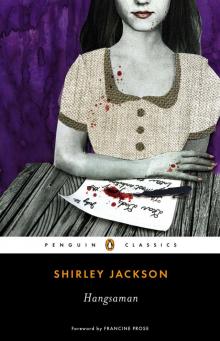 Hangsaman
Hangsaman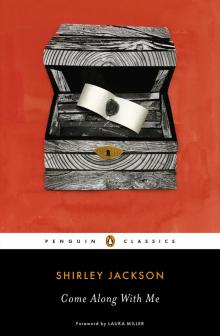 Come Along With Me
Come Along With Me The Lottery
The Lottery Just an Ordinary Day: Stories
Just an Ordinary Day: Stories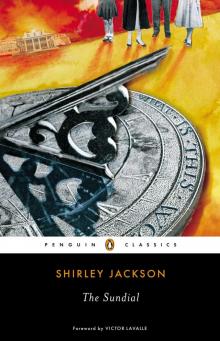 The Sundial
The Sundial Dark Tales
Dark Tales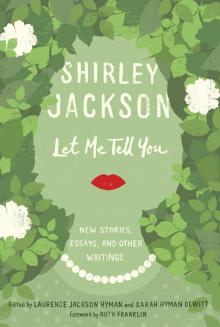 Let Me Tell You: New Stories, Essays, and Other Writings
Let Me Tell You: New Stories, Essays, and Other Writings The Haunting of Hill House
The Haunting of Hill House The Bird's Nest
The Bird's Nest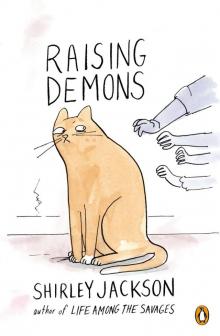 Raising Demons
Raising Demons We Have Always Lived in the Castle
We Have Always Lived in the Castle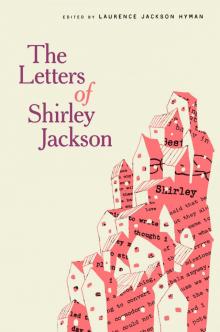 The Letters of Shirley Jackson
The Letters of Shirley Jackson The Missing Girl
The Missing Girl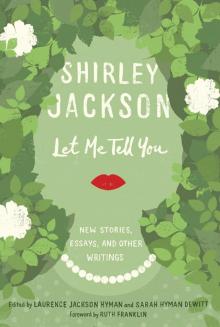 Let Me Tell You
Let Me Tell You